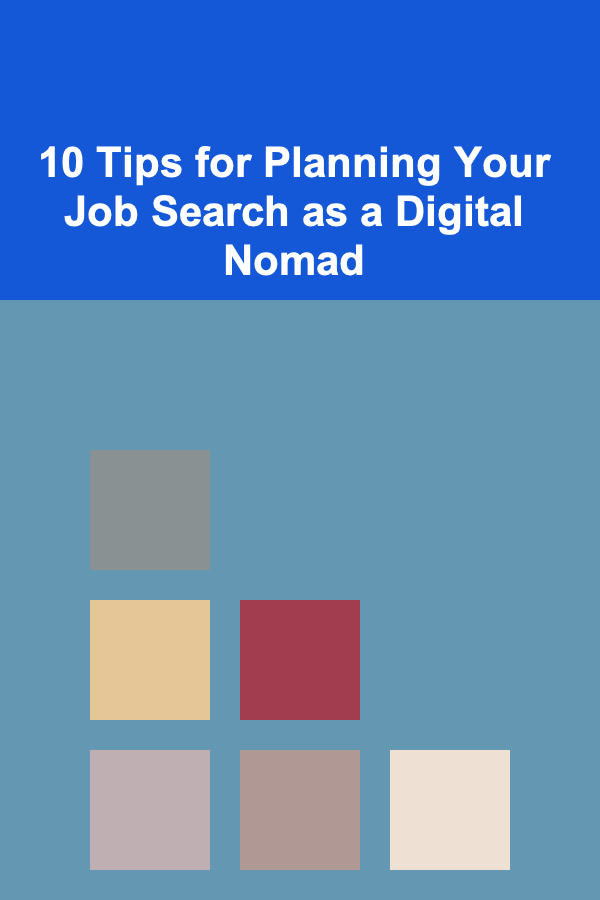
10 Tips for Planning Your Job Search as a Digital Nomad
ebook include PDF & Audio bundle (Micro Guide)
$12.99$10.99
Limited Time Offer! Order within the next:

The world is increasingly shifting toward remote work, and with this change comes a unique opportunity for individuals to break free from traditional office environments. Digital nomads are people who work remotely while traveling the world, choosing flexibility, adventure, and independence over the 9-to-5 grind. However, the allure of being able to work from anywhere doesn't mean that landing and maintaining a remote job is effortless. In fact, planning your job search as a digital nomad requires thoughtful strategy, flexibility, and a proactive approach to ensuring that you find the right job opportunities that align with both your skills and lifestyle.
In this article, we will explore 10 actionable tips to help you plan your job search effectively as a digital nomad. From understanding your own goals to choosing the right tools for the job, these strategies will empower you to navigate the increasingly competitive remote job market.
Know Your Skills and Strengths
Before diving into a job search, it's important to clearly understand what you bring to the table. As a digital nomad, you will likely be competing against a global pool of talent, so it's essential to have a deep understanding of your core skills and strengths. Identifying these will help you focus on job opportunities that not only suit your capabilities but also align with your interests and long-term goals.
Key Questions to Ask Yourself:
- What skills do I excel at? Consider both hard skills (e.g., coding, graphic design, writing, etc.) and soft skills (e.g., communication, project management, leadership).
- What industries am I interested in? Reflect on what types of jobs or industries excite you most, whether it's tech, education, marketing, customer service, or something else.
- What do I want from my job? Do you want flexibility in your hours? A high-paying role? Work that aligns with a passion? Understanding your priorities will help guide your job search.
Once you have a clear picture of your strengths, you can tailor your job search to focus on positions where you can truly shine and make a meaningful impact.
Research Remote Job Platforms
Digital nomads typically find job opportunities through specialized remote job platforms. These platforms focus on offering remote, freelance, and contract positions, and they often cater to a variety of industries such as tech, marketing, writing, design, customer support, and more. The beauty of these platforms is that they are dedicated to helping remote workers find flexible, location-independent opportunities.
Some popular platforms include:
- We Work Remotely: A large platform with job listings in categories like programming, design, and customer support.
- Remote.co: Offers a curated list of remote jobs and resources for digital nomads.
- FlexJobs: A subscription-based platform with verified remote and flexible job listings.
- Upwork/Freelancer: Great for freelancers looking to find contract-based work across a wide range of industries.
- AngelList: If you're interested in startup opportunities, AngelList is a great place to find remote jobs with growing companies.
By regularly checking these platforms and signing up for job alerts, you'll stay updated on new opportunities as soon as they're posted.
Tailor Your Resume and Portfolio for Remote Work
When applying for remote positions, it's essential to customize your resume and portfolio to highlight your ability to work independently, manage your time efficiently, and communicate effectively in a virtual environment. Many remote job employers look for candidates who are self-starters and can perform well without constant supervision, so make sure your application materials reflect these qualities.
Tips for a Remote-Friendly Resume:
- Highlight Remote Experience: If you've worked remotely in the past, emphasize that experience on your resume.
- Skills for Remote Work: Include skills such as project management, time management, and proficiency with remote work tools (e.g., Slack, Zoom, Trello, Asana).
- Showcase Adaptability: Demonstrate your ability to work across different time zones, adapt to new technologies, and collaborate in a virtual environment.
- Portfolio: For creative roles (e.g., design, writing, photography), make sure your portfolio is online and easily accessible. Showcase your best work that aligns with the types of remote positions you are applying for.
By tailoring your resume and portfolio specifically for remote work, you increase your chances of getting noticed by employers who are looking for remote-ready candidates.
Optimize Your LinkedIn Profile
LinkedIn is one of the most powerful tools in the digital nomad's job search arsenal. Recruiters frequently use LinkedIn to find qualified candidates for remote positions. Therefore, it's crucial to have an optimized LinkedIn profile that reflects your remote work skills and experience.
Tips for Optimizing Your LinkedIn:
- Highlight Remote Work: Use your headline and summary sections to make it clear that you are looking for remote opportunities and highlight your remote work experience.
- Join Remote Work Groups: LinkedIn has various groups dedicated to remote work and digital nomads. By joining these groups, you can engage with other professionals, share tips, and discover job leads.
- Skills & Endorsements: Include relevant skills, such as "remote work," "self-management," and specific technical skills. Encourage connections to endorse your skills.
- Networking: Reach out to people who are currently remote workers or digital nomads. Building relationships can sometimes lead to job opportunities through referrals.
An optimized LinkedIn profile can be the difference between landing your dream remote job and being overlooked by employers.
Set Realistic Expectations
When planning your job search as a digital nomad, it's important to set realistic expectations. Landing a remote job can take time, and it may take several applications, interviews, and adjustments before you land the right role. Additionally, the remote job market can be competitive, and employers may have specific criteria for hiring.
Things to Consider:
- Time Zone Differences: Many remote jobs require you to collaborate with teams across multiple time zones. This could mean late-night or early-morning meetings, so be prepared for that lifestyle shift.
- Salary Expectations: Some remote jobs may offer lower salaries, especially if they're based in regions with lower living costs. Make sure to research the average salary for your position and negotiate accordingly.
- Trial Periods: Some companies offer trial periods for remote workers to test their fit within the team. Be open to this arrangement, as it can lead to long-term employment.
By setting realistic expectations and being patient, you're less likely to become discouraged and more likely to find a job that's a good fit for both your skills and your desired lifestyle.
Build a Personal Brand
As a digital nomad, your personal brand is incredibly important. You are not just a job seeker; you are building a career that revolves around you and your unique skills. A strong personal brand can help you stand out in a competitive job market and demonstrate to employers that you are a credible and experienced remote worker.
Steps to Build Your Personal Brand:
- Create a Personal Website: A website can serve as your digital resume, showcasing your skills, portfolio, and contact information. It's a great way to differentiate yourself from other candidates.
- Blog or Create Content: Sharing industry-related articles, insights, or case studies can position you as an expert in your field. Many successful digital nomads leverage blogging or content creation to build their personal brand.
- Social Media Presence: Use social media platforms like Twitter, Instagram, and YouTube to share your experiences as a digital nomad, promote your work, and engage with a like-minded community.
A strong personal brand can help you attract job opportunities and make valuable connections that could accelerate your career as a digital nomad.
Leverage Your Network
Networking is key to finding remote work opportunities. The digital nomad community is large, but it's also close-knit. Leveraging your existing network can help you discover job opportunities that may not be publicly listed.
Networking Tips for Digital Nomads:
- Attend Virtual Events: Participate in webinars, virtual conferences, and meetups where you can interact with other remote workers and potential employers.
- Ask for Referrals: Reach out to friends, former colleagues, or professional contacts who are familiar with remote work and ask for job leads or recommendations.
- Be Active in Online Communities: Join Facebook groups, Reddit threads, and online forums where digital nomads and remote workers gather. Engage in conversations, share your experiences, and look for job leads.
Networking is one of the most effective ways to find remote job opportunities that align with your skills and lifestyle.
Prepare for Remote Interviews
Remote job interviews differ from traditional in-person interviews. They often take place via video conferencing platforms like Zoom or Skype, which means you need to be prepared for a different type of interaction.
Tips for Successful Remote Interviews:
- Test Your Technology: Ensure that your internet connection, microphone, camera, and any other required tools are functioning properly.
- Set the Right Environment: Choose a quiet, professional background with good lighting to make a positive impression.
- Prepare for Technical Questions: Be ready to demonstrate your technical skills and discuss your experience with remote work tools.
- Communicate Clearly: Since you're not in the same physical space as the interviewer, clear communication is even more important. Speak slowly and articulate your thoughts well.
By preparing for remote interviews effectively, you can make a strong impression and increase your chances of landing the job.
Stay Organized and Focused
The process of searching for a remote job can be time-consuming and challenging, especially if you're applying for multiple positions. Staying organized will help you track your applications, deadlines, and follow-ups, ensuring that you don't miss out on any opportunities.
Reading More From Our Other Websites
- [Home Budget 101] How to Build a Home Budget for Your Small Business or Freelance Work
- [Organization Tip 101] How to Track Your Expenses Effectively Using Apps
- [Paragliding Tip 101] Best Paragliding Routes for Photographers Capturing Sunrise Over the Grand Canyon
- [Home Soundproofing 101] How to Soundproof a Heating Duct: Simple Methods for Noise Reduction
- [Organization Tip 101] How to Design a Weekly Meal Planning and Prep System
- [Home Pet Care 101] How to Choose a Good Pet Groomer Specializing in Specific Breeds or Sensitive Skin
- [Tiny Home Living Tip 101] Best Pet‑Friendly Tiny Home Layouts: Keeping Your Furry Friends Comfortable in Small Spaces
- [Home Rental Property 101] How to Find No Credit Check Apartments Without Falling for Scams
- [Personal Investment 101] How to Invest in Fractional Real Estate for Beginners
- [Personal Finance Management 101] How to Start a Family Budget Without Conflict

How to Choose the Right Domain Name: A Complete Checklist
Read More
How to Incorporate Seasonal Colors into Your Holiday Decorations
Read More
How to Organize Your Linen Closet for Maximum Storage Capacity
Read More
How to Stage a Home to Make It Feel Cozy and Inviting
Read More
How to Build Self-Love Before Dating
Read More10 Tips to Minimize Credit Card Fees: A Tracker's Perspective
Read MoreOther Products

How to Choose the Right Domain Name: A Complete Checklist
Read More
How to Incorporate Seasonal Colors into Your Holiday Decorations
Read More
How to Organize Your Linen Closet for Maximum Storage Capacity
Read More
How to Stage a Home to Make It Feel Cozy and Inviting
Read More